
Earn a Associate in Accounting Online
- $330/credit (60 credits)
- 100% online instruction
- Transfer up to 45 credits toward your associate degree
- Stacks seamlessly into BS in Accounting
- No application fee or SAT/ACT scores required
- Increase your earning potential with an associate degree
Online Associate in Accounting Program Overview
Develop the accounting and business skills that employers desire with an online Associate of Science (AS) in Accounting from Southern New Hampshire University. The associate degree in accounting is perfect for professionals who want to enter an accounting-related field or lay the groundwork for continuing their education in accounting or business.
Once you earn your associate degree, you'll be prepared to jump into entry-level roles in your industry. You'll learn how to apply financial, managerial and cost accounting principles to your daily work and become an asset to any company.
You'll get practice with accounting tools including Microsoft Suite, Excel, PowerPoint and Word. You'll also have the opportunity to earn certifications in Wiley Excel for Accountants, and identify how Excel can be used for mission-critical tasks such as calculating profits, losses and margins; doing what-if analysis; and analyzing large data sets.
The credits you earn from your associate accounting degree at SNHU seamlessly stack into our online BS in Accounting. This means you can earn 2 degrees in the same time it takes to get just 1. Plus, if you'd like to become a certified public accountant (CPA), our bachelor's program aligns with the 2024 CPA exam update.
No matter where your education takes you, earning your associate degree could be a good investment. According to data from the U.S. Bureau of Labor Statistics, median weekly earnings of those with associate degrees were $152 more than those whose education stopped after graduating high school.1
In the associate in accounting program, you'll learn how to:
- Identify organizations that establish accounting standards regulations
- Maintain financial records and statements
- Analyze, interpret and present information to stakeholders
- Identify the steps in the ethical decision-making process
If you're interested in higher-level education, check out our bachelor's in accounting degree online.
Career Outlook
The online associate degree in accounting provides a solid foundation in accounting principles and practices to prepare you for entry-level positions in nearly every industry. And when it comes to office and administrative support, earning your associate in accounting could position you well for many roles.
According to the U.S. Bureau of Labor Statistics (BLS), bookkeeping, accounting and auditing clerks made a median annual salary of $45,860 in 2022.1 Similarly, financial clerks were reported to make $45,570 in the same time period.1
With your associate degree in accounting, you'll be qualified for these roles and a number of entry-level jobs including:
- Accounts receivable clerk
- Accounting assistant
- Billing clerk
- Bookkeeper
- Payroll clerk
The technical skills you'll gain from your associate degree in accounting will be integral in these positions. But you might find that being a good candidate for a particular role requires other qualities – like being analytic, inquisitive and proactive.

Getting an associate degree can also improve your earning potential. In 2022, the BLS reported associate degree holders' median weekly earnings were almost 18% higher than those of workers who didn't continue their education beyond high school.1 Additionally, the BLS cited people with associate degrees experienced a lower unemployment rate (2.7%) in 2022 than workers with only high school diplomas (4.0%).1
If you want to move on to higher-paying roles in accounting, you'll want to continue your education after finishing your associate degree. Our bachelor's in accounting is an obvious next step, but we also provide a myriad of other business degrees – and beyond – that are worth exploring.
That's exactly what Makya Vandiver-Hawkins '21 decided to do after completing her associate degree program.
"I am continuing on to a bachelor’s in business administration with a concentration in accounting because of all of the work that I have completed in obtaining my associate in accounting degree," said Vandiver-Hawkins.
And if the end goal is becoming a qualified accounting professional, a bachelor's degree in accounting can also provide some of the educational requirements necessary to pursue professional certifications such as certified management accountant (CMA) and certified public accountant (CPA). Requirements to sit for the CPA exam vary from state to state. Our licensure and certification disclosure page outlines SNHU's programs and fulfillment of CPA exam requirements by state.
Understanding the Numbers
When reviewing job growth and salary information, it’s important to remember that actual numbers can vary due to many different factors — like years of experience in the role, industry of employment, geographic location, worker skill and economic conditions. Cited projections do not guarantee actual salary or job growth.
Start Your Journey Towards an Online Accounting Degree
Why SNHU For Your Associate Degree in Accounting
Flexible
With no set class meeting times, you can learn on your schedule and access online course materials 24/7.
Affordable
As part of our mission to make higher education more accessible, we’re committed to keeping our tuition rates low. In fact, we offer some of the lowest online tuition rates in the nation.
Prior coursework could also help you save time and money. SNHU’s transfer policy allows you to transfer up to 90 credits toward your bachelor's degree and 45 credits for an associate degree from your previous institutions—that means you could save up to 75% off the cost of tuition. You could also save time and money by getting college credit for previous work experience, or by taking advantage of military discounts and employer tuition assistance if available to you.
Respected
Founded in 1932, Southern New Hampshire University is a private, nonprofit institution with over 160,000 graduates across the country. SNHU is accredited by the New England Commission of Higher Education (NECHE), a regional accreditor, which advocates for institutional improvement and public assurance of quality.
Recently, SNHU has been nationally recognized for leading the way toward more innovative, affordable and achievable education:
- U.S. News & World Report named SNHU the 2021 Most Innovative University in the North and one of the nation's "Best Regional Universities"
- Awarded the 21st Century Distance Learning Award for Excellence in Online Technology by The United States Distance Learning Association (USDLA)
- A $1 million grant from Google.org to explore soft skills assessments for high-need youth
Network
At Southern New Hampshire University, you'll have access to a powerful network of more than 300,000 students, alumni and staff that can help support you long after graduation. Our instructors offer relevant, real-world expertise to help you understand and navigate the field. Plus, with our growing, nationwide alumni network, you'll have the potential to tap into a number of internship and career opportunities.
93.6% of online students would recommend SNHU (according to a 2022 survey with 17,000+ respondents). Discover why SNHU may be right for you.
Admission Requirements
Expanding access to quality higher education means removing the barriers that may stand between you and your degree. That’s why you can apply at any time and get a decision within days of submitting all required materials:
- Completed free undergraduate application
- Prior transcripts, which we can retrieve at no cost to you
- Test scores are not required as part of your application
Acceptance decisions are made on a rolling basis throughout the year for our 6 (8-week) undergraduate terms.
How to Apply
If you’re ready to apply, follow these simple steps to get the process going:
- Complete a free undergraduate application
- Submit any additional documents required
- Work with an admission counselor to explore financial options and walk through the application process
If you have questions or need help filling out your application, call 1.888.387.0861 or email enroll@snhu.edu.
Courses & Curriculum
This 60-credit online accounting degree curriculum can give you a foundation in essential accounting principles and practices. You’ll understand how to handle a company’s finances, the basics of economics, statistics and how marketing plays a role in the world of accounting. Courses are taught by instructors with professional credentials and experience in accounting, taxation and fraud examination.
Interested in accounting, but afraid of taking math courses? Don't be. According to our instructors, communication skills are more important than being a math whiz when it comes to accounting.
"We have technology to do the math," said Mona Stephens, accounting lead faculty at SNHU. "Accounting is really all about problem-solving and storytelling."
Throughout your studies, you'll gain a foundational understanding of accounting. Some expected courses in your associate in accounting program include:
- Financial Accounting. Study the steps of the accounting cycle and how to prepare financial statements. You'll develop skills in financial accounting information analysis, stakeholder communications and accounting procedures.
- Managerial Accounting. Explore the financial impact of business decisions. Learn how to use accounting and productivity information to improve organizational performance. With new data-gathering skills, you'll be able to plan growth strategies and make informed decisions.
- Intermediate Accounting I. Examine financial statement elements and the interplay of various financial transactions. You'll apply theoretical frameworks and research accounting principles and concepts for the proper preparation and interpretation of financial statements.
- Federal Taxation I. Learn about current U.S. tax laws, the Internal Revenue Code (IRC) and source documents relevant to federal tax returns for individuals. Using the applicable tax laws, you'll learn how to prepare federal tax returns for individuals. Evaluate current U.S. tax laws and the Internal Revenue Code (IRC), as well as the relevant source documents, associated with federal tax returns for individuals. You'll research and apply the appropriate tax laws in relation to the specific circumstances and tax liabilities.
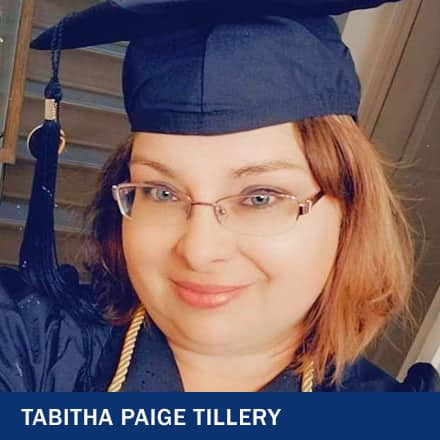
"The instructors at SNHU are remarkable," said Tabitha Paige Tillery '20. "They made sure that you knew they were there for you. Didn't matter the hours I was doing my schoolwork, someone was always there to help."
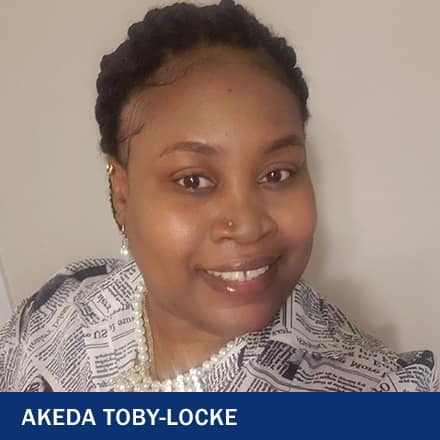
"My instructors were always one call or email away when I had concerns or questions about my courses," she said. "They guided me on completing my assignments to their expectations and the best of my ability, and shared helpful resources and information that provided additional knowledge and insights about the courses."
No matter the course, our instructors can help equip you with the relevant specialized accounting skills you need to start a career in accounting.
But according to our own faculty, accountants need to be more than just technically proficient in accounting.
"The accountant of the future needs to be intellectually curious, always learning, able to figure out how to solve problems, analyze and visualize data, and effectively communicate with non-accountants," said Stephens. "A great way to start is to hone those intellectual curiosity and problem-solving skills."
That's why the associate accounting curriculum integrates other general education and business-related knowledge. Major courses include some less expected classes such as:
- Business Law I. Examine the background and ethical aspects of the U.S. legal system as it applies to business organizations. Understand how contracts, criminal and cyber law, product liability and torts impact business.
- Managing and Leading in Business. Explore leadership and management theories and how to incorporate them in your own personal style for effective contribution and collaboration in diverse team environments.
- Global Dimensions in Business. Examine the differences between the domestic and international business environments and factors that contribute to market attractiveness and entry.
- Applied Marketing Strategies. Analyze pricing, distribution, product development, and promotional strategies to reach a specific market audience. Discover how communications and distribution channels can lead to successful marketing.
When you graduate with your associate degree in accounting, you can count on having both widely applicable skills and highly specified accounting knowledge. This means you can go on to pursue entry-level jobs or more advanced degrees in any number of fields.
Curriculum Requirements & Resources
- Technology resources: We provide cloud-based virtual environments in some courses to give you access to the technology you need for your degree – and your career. Learn more about our virtual environments.
- Earn math credits for what you already know: Save time and tuition with our Pathways to Math Success assessments. Depending on your scores, you could earn up to 12 math credits – the equivalent of 4 courses – toward your degree for less than $50 per assessment. For additional information, or to register for a Pathways to Math Success assessment, contact your admission counselor or academic advisor today.
| View Full Curriculum in the Catalog |
|---|
| AS in Accounting |
| Courses May Include | ||
|---|---|---|
| AS in Accounting | ||
| ACC 201 | Financial Accounting | Students will learn the steps of the accounting cycle and how to prepare financial statements in accordance with industry established rules and regulations. Students will develop skills needed to analyze financial accounting information, communicate this information to stakeholders, and understand the accounting procedures that produce this information. |
| ACC 202 | Managerial Accounting | Students will explore the financial impact of short-term and long-term business decisions. By learning how accounting and other productivity information can be used to assess and improve performance of an organization, managers will be provided the essential information they need to execute growth strategies and select opportunities that create business value. |
| ACC 317 | Intermediate Accounting I | In this course, students will take an in-depth look at financial statement elements and the interplay of various financial transactions represented on a financial statement. Students will apply theoretical frameworks and research accounting principles and concepts for the proper preparation and interpretation of financial statements. Students will utilize authentic industry tools and technologies to prepare financial statements and connect concepts learned to the importance of financial information for its users. |
| ACC 330 | Federal Taxation I | In this course, students will learn about current US tax laws and the Internal Revenue Code (IRC), as well as the relevant source documents, associated with federal tax returns for individuals. Students will research and apply the appropriate tax laws in relation to the specific circumstances and tax liabilities. Students will prepare federal tax returns and communicate various tax return information to stakeholders. |
| BUS 210 | Managing and Leading in Business | Students will explore leadership and management theories and how to incorporate them in one's own personal style for effective contribution and collaboration in diverse team environments, and learn about the skills necessary to lead in various organizational structures and areas of business. Students will also examine how the functional areas of business are interrelated and work together in organizations. |
| BUS 225 | Critical Business Skills for Success | Students will learn the critical business skills required for successful leadership and management in organizations. By applying business research skills and data analysis, students will solve problems and support business decisions. Students will also explore various techniques and forms of professional communications and their uses in business contexts. |
| Total Credits: 60 | ||
Minimum Hardware Requirements
|
Component Type |
PC (Windows OS) |
Apple (Mac OS) |
|---|---|---|
|
Operating System |
Currently supported operating system from Microsoft. |
Currently supported operating system from Apple. |
|
Memory (RAM) |
8GB or higher |
8GB or higher |
|
Hard Drive |
100GB or higher |
100GB or higher |
|
Antivirus Software |
Required for campus students. Strongly recommended for online students. |
Required for campus students. Strongly recommended for online students. |
|
SNHU Purchase Programs |
||
|
Internet/ Bandwidth |
5 Mbps Download, 1 Mbps Upload and less than 100 ms Latency |
5 Mbps Download, 1 Mbps Upload and less than 100 ms Latency |
Notes:
- Laptop or desktop? Whichever you choose depends on your personal preference and work style, though laptops tend to offer more flexibility.
- Note: Chromebooks (Chrome OS) and iPads (iOS) do not meet the minimum requirements for coursework at SNHU. These offer limited functionality and do not work with some course technologies. They are not acceptable as the only device you use for coursework. While these devices are convenient and may be used for some course functions, they cannot be your primary device. SNHU does, however, have an affordable laptop option that it recommends: Dell Latitude 3301 with Windows 10.
- Office 365 Pro Plus is available free of charge to all SNHU students and faculty. The Office suite will remain free while you are a student at SNHU. Upon graduation you may convert to a paid subscription if you wish. Terms subject to change at Microsoft's discretion. Review system requirements for Microsoft 365 plans for business, education and government.
- Antivirus software: Check with your ISP as they may offer antivirus software free of charge to subscribers.
Tuition & Fees
As a private, nonprofit university, we’re committed to making college more accessible by making it more affordable. That’s why we offer some of the lowest online tuition rates in the nation.
We also offer financial aid packages to those who qualify, plus a 30% tuition discount for U.S. service members, both full and part time, and the spouses of those on active duty.
| Online Undergraduate Programs | Per Course | Per Credit Hour | Annual Cost for 30 credits |
|---|---|---|---|
| Degree/Certificates | $990 | $330 | $9,900 |
| Degree/Certificates (U.S. service members, both full and part time, and the spouses of those on active duty)* | $693 | $231 | $6,930 |
Tuition Rates are subject to change and are reviewed annually. *Note: students receiving this rate are not eligible for additional discounts.
Additional Costs No Application Fee, Course Materials ($ varies by course)
Frequently Asked Questions
Can you get an associate in accounting?
Yes, you can. An associate degree in accounting is a great way to jumpstart an accounting career and can help you gain professional experience faster.
While many accounting jobs require a bachelor’s degree, an accounting associate degree will give you the skills you need to succeed in entry-level roles. The credits you earn from an AS in Accounting degree from SNHU can also easily stack into a BS in Accounting – meaning you could earn 2 degrees in the same amount of time it takes to get 1.
With an online associate degree in accounting, you’ll gain a strong foundation of key career skills through general education courses, including communication, critical thinking, problem-solving and decision making.
You’ll also explore accounting, finance and business topics, and learn how to apply this knowledge to daily accounting work. Your accounting associate degree will explore:
- Financial accounting
- Managerial accounting
- Taxation
- Business law
- Business systems analysis
- Marketing
- Human relations
- Information technology
- International business
How much do accountants with an associate degree make?
It depends on your career path. While earning an associate degree in accounting can help you earn more than workers without a college degree, specific salaries will vary.
In 2022, the median annual salary for bookkeeping, accounting and auditing clerks, for example, was $45,860 — with the highest 10% earning more than $65,540.1 That same year, financial clerks earned a median salary of $45,570, while bill and account collectors earned a median salary of $39,470.1
Continuing your accounting education with a bachelor’s degree, online master’s in accounting, accounting certification or a graduate certificate in accounting can open up more job opportunities and lead to higher pay.
What is the best online college for accounting?
The best online college for accounting is the one that prepares you for the career you want and offers the flexibility to help you achieve your goals, whether you’re working full time or balancing coursework with family obligations.
That's why Akeda Toby-Locke '19 chose Southern New Hampshire University.
"In the beginning, I was very nervous, as this was my first time studying online," she said. "But as time went by, it became my norm, and I really enjoyed the flexibility to study and complete my assignments by the specific deadlines on my time."
At SNHU, the online associate in accounting is designed to give you the skills you need to get started in entry-level accounting jobs faster. And our innovative online programs ensure you have the support you need to complete your degree.
Online students have access to a wide range of virtual student services, including writing help, tutoring and academic and career advising.
During her associate degree program, Makya Vandiver-Hawkins '21 relied on these resources and the continuous support of her SNHU community to help her earn her degree.
"Studying online was, at times, difficult when there were times that I needed to have someone by my side walking me through something," said Vandiver-Hawkins. "Thankfully there is 24/7 tutoring that I took advantage of during these times."
Online clubs and student organizations are also offered to help you grow your personal network and get hands-on learning experience.
SNHU’s generous transfer policy allows up to 45 credits from a previous institution to be applied to one of our associate degree programs. If you’ve completed some college coursework already, this means you can save money and time, and start your career even faster.
Is an associate in accounting worth it?
If you want to start your accounting career right away, then yes. With an associate in accounting, you can gain the skills you need to kick off an accounting career and start gaining valuable professional experience faster. In today's job market, more students are seeking this faster-paced option.
Earning an online associate degree in accounting can also help boost your long-term earning and career potential.
According to the U.S. Bureau of Labor Statistics (BLS), associate degree holders earned nearly 18% more each week in 2022 than workers with only a high school diploma.1 Plus, workers with associate degrees saw an unemployment rate of just 2.7% in 2022, while workers with only high school diplomas saw an unemployment rate of 4.0%.1
But there's more to an associate degree in accounting than just earning potential. It's an opportunity to put your goals within reach.
"[This program] helped me get a degree that I can use and helped prove to myself that I could accomplish anything," said Tabitha Paige Tillery '20.
If you want to advance your career even further, earning an associate degree can give you a head start toward earning a bachelor’s in accounting degree. An SNHU bachelor’s degree in accounting can provide the educational requirements needed to pursue valuable professional certifications, like certified management accountant (CMA) and certified public accountant (CPA).
How much does an accountant with an associate degree make an hour?
It varies based on your specific role and the industry in which you work. For example, the median annual salary for bookkeeping, accounting and auditing clerks was $45,860 in 2022 — or $22.05 per hour.1
But pay varied for bookkeeping, accounting and auditing clerks depending on the industry in which they worked. Those in finance and insurance earned a median salary of $47,410 in 2022, while those in the retail trade earned a median wage of $39,880 that same year.1
Accountants earned a median salary of $78,000 in 2022.1 But these jobs typically require a bachelor’s degree or master’s degree in accounting and may require a professional certification.
Are online degrees taken seriously?
Yes, they are. As technology evolves and more of our daily lives move online, students and employers alike are recognizing the value of an online degree.
Online learning continues to grow in higher education. According to the National Center for Education Statistics, some 75%, or 11.8 million, undergraduate students were enrolled in at least one distance education course in the Fall of 2020 as a result of the COVID-19 pandemic, while another 44%, 7 million, took exclusively distance education courses. While this number has come down since the peak of the pandemic, some aspects of distance education are expected to stay in schools across the U.S. for the foreseeable future. In many ways, online learning was normalized in a permanent way as a result of the pandemic.2
At SNHU, we have been offering online coursework for over 25 years. Our online accounting courses are taught by faculty with years of experience in the field, ensuring you have access to the most up-to-date information and accounting practices. And while your coursework may be online, you’ll gain key career skills through hands-on learning opportunities, so you can apply your learning to the day-to-day work of accounting right away.
University Accreditation
Southern New Hampshire University is a private, nonprofit institution accredited by the New England Commission of Higher Education (NECHE) as well as several other accrediting bodies.
This program and its concentrations are accredited by the Accreditation Council for Business Schools and Programs (ACBSP). Student achievement data can be found on College Navigator.
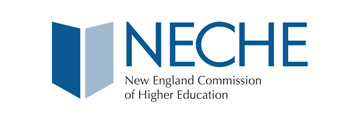

Related Articles
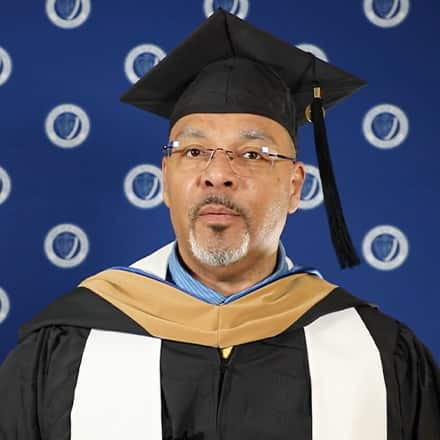
SNHU Spotlight: Jeffrey Harris, MBA Grad
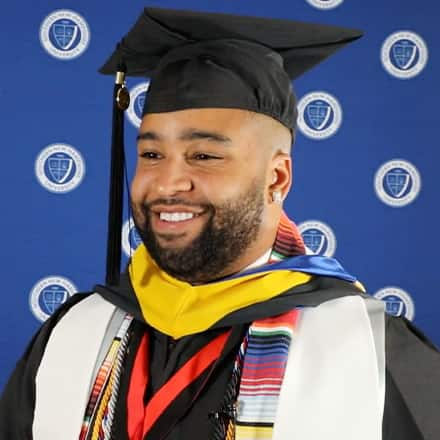
SNHU Spotlight: Luis Polanco, BS in Business Administration Grad
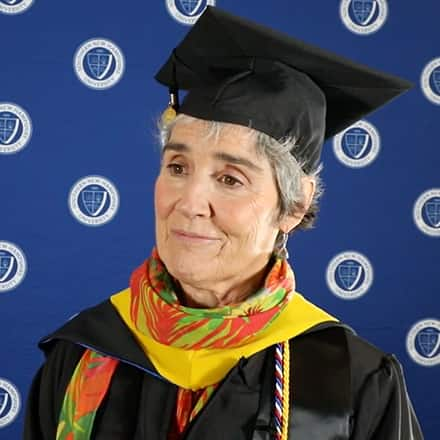
SNHU Spotlight: Lynda Jarrett, BS in Business Administration Grad
References
Sources & Citations (1, 2)
1Bureau of Labor Statistics, U.S. Department of Labor, Occupational Outlook Handbook, on the internet, at:
- https://www.bls.gov/emp/chart-unemployment-earnings-education.htm (viewed Nov. 1, 2023)
- https://www.bls.gov/OOH/office-and-administrative-support/bookkeeping-accounting-and-auditing-clerks.htm (viewed Nov. 1, 2023)
- https://www.bls.gov/ooh/office-and-administrative-support/financial-clerks.htm (viewed Nov. 1, 2023)
- https://www.bls.gov/ooh/office-and-administrative-support/bill-and-account-collectors.htm (viewed Nov. 1, 2023)
- https://www.bls.gov/OOH/business-and-financial/accountants-and-auditors.htm (viewed Nov. 1, 2023)
2National Center for Education Statistics, Distance Learning Fast Facts, on the internet, at https://nces.ed.gov/fastfacts/display.asp?id=80 (viewed July 13, 2022)

